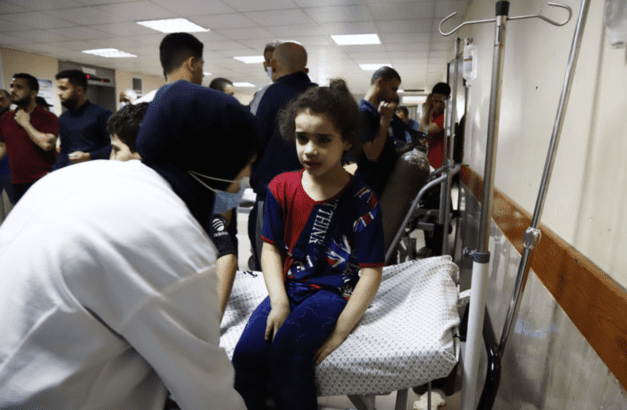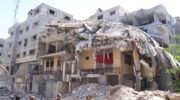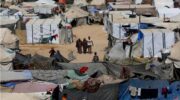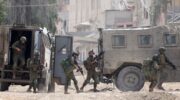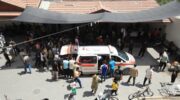Nowhere was the human toll of Israel’s May 2021 aggression felt more acutely than at al-Shifa hospital, which was frequently overwhelmed and chronically understocked.
Israel has invaded and destroyed Palestinian hospitals and clinics, attacked patients, denied medical travel permits for Palestinians, and targeted Palestinian healthcare workers. Western health officials often overlook these acts – which are nothing short of war crimes…
The American Medical Association has issued no shortage of press releases calling the targeting of healthcare workers in Ukraine “unconscionable.” They must also do this for Palestinians.
Below are two recent articles on Israel’s frequent attacks on medical institutions, patients, and employees – and calls for the global medical community to end Israel’s impunity:
by Emily Hacker, reposted from Electronic Intifada, June 2, 2022
In May 2021, the Israeli military dropped hundreds of bombs on the Gaza Strip, destroying houses, schools, businesses, and health care facilities.
Perhaps nowhere was the human toll of that month more apparent than at al-Shifa hospital, the “only hospital in Gaza equipped for emergency assistance.”
Doctors worked for days on end, rarely sleeping or eating and unable to see their families as they frantically treated hundreds of wounded Palestinian patients – at least, those patients who could actually reach the hospital.
Outside the hospital grounds, streets were so badly damaged by Israeli airstrikes that paramedics struggled to bring patients directly to al-Shifa.
In the span of those 11 days in May, Israeli occupation forces wreaked havoc on Gaza’s already precarious public health system, damaging or destroying 19 medical centers, including the offices of the Palestine Children’s Relief Fund, a nonprofit that provides cancer treatment and medical prosthetics to children who are unable to seek care outside of Gaza due to Israeli blockades.
The Israeli military’s actions in 2021 were, unfortunately, nothing new. Numerous Israeli bombing campaigns have damaged or destroyed primary health infrastructure in the occupied Gaza Strip, including clinics and hospitals as well as key public health services like water treatment facilities, sewage treatment plants, and electrical grids.
This is not accidental. Israel relies on – among other strategies – the destruction of Palestinian health infrastructure, the targeting of medical personnel, and inhibiting Palestinian access to health care to enforce its regime of apartheid.
Yet Western health officials often overlook these acts, which are nothing short of war crimes, and this passive complicity violates our promise as health care professionals to do no harm. The physical and mental health of the Palestinian people is a central component of Palestinian liberation and must be discussed as such.
A health care void
Israel’s military offensives against Palestine have both created and exacerbated existing public health concerns within the occupied Gaza Strip and West Bank. Beginning with the Nakba in 1948, Israel has made it a matter of policy to destroy not only Palestinian homes and communities, but clinics, hospitals, and other health infrastructure.
Israeli airstrikes on Gaza in 2021 damaged or destroyed numerous clinics, a water treatment facility, and infrastructure related to COVID-19 testing and treatment. Nearly 2,000 Palestinians in Gaza were injured during Israel’s May 2021 military assault and hospitals were overwhelmed.
The outright destruction of Palestinian health infrastructure, such as the bombing of a clinic operated by Doctors Without Borders, is accompanied by direct physical violence against health care personnel.
The Israeli military have killed medical professionals, including doctors Ayman Abu al-Ouf and Muin al-Aloul in 2021 and paramedic Razan al-Najjar, who was killed by Israeli snipers in 2018.
Often leaders and pillars of their communities, doctors killed by the Israeli military leave behind both a physical and psychological void of health care and security.
The actions of the Israeli government and occupying military forces are indefensible by any interpretation of international humanitarian law, yet they are ignored at every opportunity by world leaders. In no other country and in no other war would such actions be left unaddressed by the Western medical community.
Since the Russian invasion of Ukraine, the American Medical Association has issued no shortage of press releases calling the targeting of civilians and healthcare workers “unconscionable.”
To be sure, the actions of Russia are unconscionable, but so too is the inaction of Western doctors and health care personnel to stand in solidarity with our Palestinian counterparts.
Bodily health is resistance
Along with the destruction of Palestinian health infrastructure and the targeted killings of Palestinian health care workers, the Israeli government imposes draconian restrictions on the movement of Palestinians seeking health care in Gaza and the West Bank.
Medical travel permits are often delayed, lost or ignored by Israeli occupation forces operating checkpoints out of Gaza. Figures from the World Health Organization estimate that the Israeli government and military accepted only 54 percent of medical travel permits in 2017.
Blockades and checkpoints operated by Israeli occupation forces grossly impede not only the day-to-day freedoms of Palestinians, but prevent ambulances from transporting critically ill and injured patients.
Despite the close proximity of the Israeli and Palestinian populations, infant and maternal mortality rates remain markedly higher for Palestinians, and life expectancy is almost 10 years shorter. The rates of stroke, hypertension, coronary artery disease, diabetes, and neonatal disorders range from three to seven times higher for Palestinians as compared with Israelis.
This is by design.
The Israeli government has removed or prevented the construction of systems of care and residences – denying building permits and demolishing homes. Living under a regime of occupation and apartheid carries with it a heavy physical toll, one that cannot be adequately expressed through statistics.
Bodily integrity and bodily health are identified as key components to individual prosperity. The right of self-determination and Palestinian liberation are incumbent upon the general health of the Palestinian population, both of which the Israeli government aims to destroy.
The health care workers and public health personnel living and working under Israeli occupation are a testament to Palestinian strength and resistance, and public health officials in Palestine must have their calls to action echoed by their colleagues internationally.
Outside of Palestine, health care professionals should be among the first to apply pressure to Western governments to end funding absent a change of Israeli behavior and to condemn and uncover Israeli war crimes.
Targeting the health care sector is a grave crime against humanity and in further analysis of global health policy, it is imperative we address Israel’s action as such.
Emily Hacker received her MPH degree from the University of Utah. Her research interests focus on public health infrastructure and emergency medical services in the context of war zones and refugee settings.

When hospitals become battlefields
The police attack on a Jerusalem hospital during Shireen Abu Akleh’s funeral is emblematic of Israel’s violent disregard for Palestinian health centers.
Many of us who either participated in the historic funeral of journalist Shireen Abu Akleh in Jerusalem, or watched it on television and phone screens worldwide, struggled to grasp the depth of shameless, crude, necropolitical violence unleashed that day.
[NOTE: read more about Shireen Abu Akleh’s death and funeral here.]
In a shocking display of cruelty, the Israeli police assaulted the pallbearers holding Abu Akleh’s coffin as they tried to carry her body from the hospital to the church where she was to be buried, followed by thousands of Palestinian mourners who had come from across the land. It was a reminder of how, in the eyes of the Israeli regime, Palestinians are unworthy of grieving, even in death.
One particular moment in this violent procession has been carved into our minds. Guevara al-Budeiri, a fellow Palestinian journalist and lifelong friend of Abu Akleh, was covering the police’s attack in the yard of Saint Joseph Hospital in Sheikh Jarrah.
Videos released from the scene showed dozens of Israeli police officers invading the hospital, throwing stun grenades and tear gas, pushing mourners back into the building, and injuring patients and visitors, all while causing damage to property. In a shaky voice, al-Budeiri reported: “The coffin did not fall… they are shooting in the hospital yard. We are talking about a hospital, not a battlefield.”
In an attempt to justify the blatant violation of bodily integrity of both the dead and the living, the Jerusalem district police claimed that they were only trying to restore calm in the midst of a “riot” — that is, the mass funeral procession itself.
The police further claimed that the pallbearers, whom they described as a “mob,” acted against the family’s wishes by taking Abu Akleh’s coffin to the masses, an account which Abu Akleh’s own brother flatly dismissed as “illogical and untrue” while slamming the police for their “extreme, vicious, and brutal force.”
The authorities essentially tried to portray the Palestinian mourners — and for that matter, the waving of the Palestinian flag — as a provocation warranting police response, using the people’s presence as an excuse to turn the hospital into a site of repression.
Impunity of attacks
As we try to make sense of Israel’s unbridled violence — unconcerned with the world’s gaze and confident in its impunity — it is important to recognize the particularly egregious nature of the police attack at Saint Joseph Hospital, and how it is emblematic of Israel’s total disregard for its duty to protect Palestinian hospitals as neutral institutions and to ensure the safety of patients and medical staff, as guaranteed by international law.
We must first remember that the Israeli police — in addition to being an agent of an occupying power which should not be in East Jerusalem in the first place — are not a source of security for Palestinians, but quite the opposite. This was most recently demonstrated during the Jerusalem Day Flag March, when thousands of ultra-nationalist Jewish Israelis paraded through Damascus Gate and the Muslim Quarter of the Old City, chanting racist slogans and attacking shop owners and Palestinian residents on their doorsteps.
While the police colluded with the marchers and provided them with protection, they simultaneously arrested scores of Palestinians during and after the march itself. It is hardly a stretch for these same police to violate the autonomy of a Palestinian hospital.
In lieu of this, although the attack at Saint Joseph’s Hospital was portrayed as an unusual event by the media and members of the international community, it was hardly the first time that Israeli forces have raided hospitals in East Jerusalem. In fact, Palestinian hospitals in the city have long been targets of repeated invasions and abuses, particularly Al-Makassed Hospital in the neighborhood of a-Tur.
In many documented cases, Israeli border police have even raided hospitals in order to arrest demonstrators being treated for wounds, while demanding the staff hand over lists and health records of the wounded persons in a clear violation of medical confidentiality. In one case, a protester who was shot by Israeli security forces with live ammunition left the hospital after receiving only primary care, fearing detention and further threat to his safety.
These attacks are part of a wider trend throughout the occupied West Bank and Gaza. In April-May 2021 alone, during the violent escalations that spread from Jerusalem to Gaza, the Israeli military carried out 132 attacks on the health sector in the occupied territories, among them injuries to health workers, damage to ambulances, damage to health facilities, and detentions or confiscations on health properties; 44 of those attacks occurred in East Jerusalem.
These incidents are rarely if ever investigated, no one is ever held to account, and the violations are not consistently condemned by the medical community locally and internationally, revealing the extent of Israel’s impunity.
Solidarity for some
The indifference, if not legitimization, exhibited by the Israeli medical community toward these systematic attacks on Palestinian health facilities and workers is noteworthy.
On May 19, less than a week after the incursion into Saint Joseph hospital and the attack on Abu Akleh’s funeral, the Israeli Medical Association (IMA) declared a national strike protesting violence against medical staff, after a patient’s family attacked physicians and nurses in Hadassah Mt. Scopus Hospital, barely a mile away from Saint Joseph’s. This horrific event has rightfully sparked wide public outcry and led the IMA to take decisive action.
And yet, when Haaretz journalist Nir Guntiz asked Prof. Zion Hagai, the head of the IMA, about his failure to condemn the police violence against Saint Joseph’s medical staff, let alone call for a strike, his answer was simple: “Yes, you are right. We don’t want to. The IMA is an apolitical organization, we don’t enter such political issues.” This remark says much about what the IMA, and the indeed wider Israeli establishment, perceives as violence against medical personnel and which staff are worthy of sympathy and solidarity.
That disinterest toward Palestinian health workers and their communities is exhibited in symbolic ways, too. During the COVID-19 pandemic, the mayor of Jerusalem decided that the best way to salute the staff of Saint Joseph Hospital for their hard work would be to fly military jets overhead on the eve of Israeli Independence Day, in what he called a “historical and exciting event that symbolized the unity against the virus.”
This “gesture” was completely tone-deaf to the Palestinians whom the state occupies, discriminates against, and systematically neglects in every field of life, and whose rights are deliberately trampled on in order for Israel to impose the city’s “unity” under its rule.
The assault on Abu Akleh’s funeral was thus the most visible and highly-televised episode in a consistent pattern of Israeli attacks on healthcare facilities. It also made clear once again that the Palestinian body has no safety — not alive nor dead, not in a battlefield nor in a hospital. It is time the international medical community recognizes the extent of violence and lack of safety that Palestinian hospitals face, and advocates for their protection from Israeli forces.

